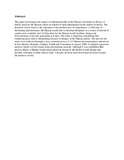| dc.contributor.author | Ndemo, Bitange | |
| dc.date.accessioned | 2013-07-22T06:42:35Z | |
| dc.date.available | 2013-07-22T06:42:35Z | |
| dc.date.issued | 2005 | |
| dc.identifier.citation | Journal of Small Business & Entrepreneurship Volume 18, Issue 2, 2005 | en |
| dc.identifier.uri | http://www.tandfonline.com/doi/pdf/10.1080/08276331.2005.10593341 | |
| dc.identifier.uri | http://erepository.uonbi.ac.ke:8080/xmlui/handle/123456789/49483 | |
| dc.description.abstract | This paper investigates the impact of entrepreneurship in the Maasai community in Kenya. It
briefly analyzes the Maasai culture in relation to their participation in the market economy. The literature review
leads to the statement of the problem and two hypotheses: (1) Because of decreasing land resources, the Maasai
would seek to develop enterprises as a source of income if capital were available, and (2) Education for the
Maasai would facilitate change and diversification of income-generating activities. The study is important considering that traditional graze land is diminishing because of changes in the Maasai culture. The data for the
study were collected through a cross-sectional survey of 113 Maasai microenterprises carried out in four districts
(Kajiado, Laikipia, Narok and Transmara) in August 2004. A multiple regression analysis model was developed
using discriminant analysis. Although it was established that given a choice, a Maasai would always invest in
livestock, the model reveals change and possibly softening of their cultural stand. Virtually all those interviewed
had livestock besides the business owned. | en |
| dc.language.iso | en | en |
| dc.publisher | Taylor & Francis | en |
| dc.title | Maasai entrepreneurship and change | en |
| dc.type | Article | en |
| local.publisher | University of Nairobi, Kenya | en |

